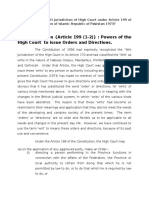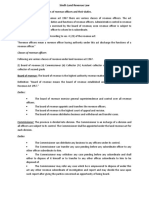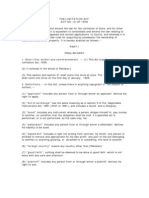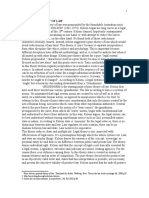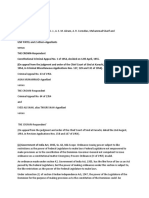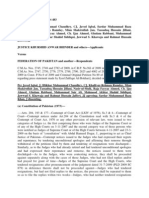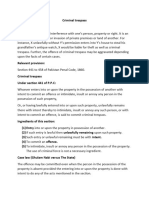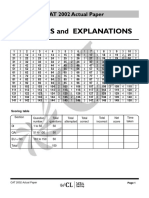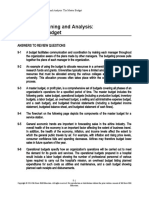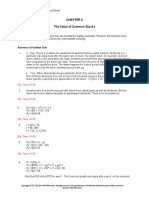Lambardar
Introduction:
The headman of a village community is called lambardar. He is appointed by the
district revenue officer/district collector in a village. The duties of lambardar are
to collect and supervise the collection of revenue of an estate. He is the
representative of the village community and a link between the government and
public.
Relevant provisions:
Section 4(28), 36 of Land Revenue Act, 1967.
Rule 17, 18 and 22 of Land Revenue Rules, 1968.
Meaning of lambardar:
For the purpose of collection of rents, revenues and other sums, a person is
appointed by the government who is known as lambardar.
Definition of lambardar:
According to section 4 28 of the land revenue act 1967
“Village Officer” means any person appointed under this Act whose duty it is to
collect, or to supervise the collection of, the revenue of an estate, and includes
Kanungos, Patawris, Zabits, Kotars or Tapedars, Peons, Arbabs, Rais and headmen
(Lambardars).
Classification of the village officer
i. Headman or lambardar.
ii. Kanungos.
iii. Patwaris.
iv. Zabits.
v. Kotars.
vi. Tapedars.
vii. Arbabs.
viii. Rais.
Rules regulating appointment etc of village officer according to section 36:
�The board of revenue with the previous approval of Government, make rules
to regulate the appointment, duties, emoluments, punishment, suspension
and removal of Village Officers.
Appointment of lambardar
The right to be appointed as lambardar is not a vested right. Any person can be
selected for the appointment as lambardar in an estate by the revenue
authorities. The appointment of lambardar is an important function as they
play a vital role in the administration of land revenue in the rural areas. They
are responsible for collecting land revenue, maintaining records of land
ownership, and resolving disputes between land owners.
Case law
2005 MLD 242
It was held that no one has a right to claim for appointment on the basis of
preference. Criteria of selection is the fitness of the candidate to perform the
responsibilities of his office.
The appointment of lambardar is regulated by the following rules
According to rule 16 of the land revenue rules, 1968
A sufficient number of headmen shall be appointed to every estate, and this
number once fixed shall not be increased or reduced except by or under the
order of the commissioner.
2. Except as provided in rule 21, if an estate or a considerable portion thereof
is owned by the government, the headman may be appointed from among the
tenants, and in the other estates he shall be appointed from among the land
owners.
Matters to be considered in the appointment of lambardar
Under rule 17
i. The hereditary claims of the candidate.
ii. Extent of property in the estate, if there are no sub divisions of the
estate, and in case there be sub divisions pf the estate the extent of
� property in the sub division for which the appointment is to be made
possessed by the candidate.
iii. Services rendered to the government by him or his family.
iv. His personal influence, character, ability and freedom from
indebtedness.
v. The strength and importance of the community from which selection of
a headman is to be made.
vi. His ability to undergo training in Civil defence in the case of headmen in
Tehsils situated along the border.
i. Hereditary claim
In the very first appointment of the lambardar, hiring authorities of
Board of revenue consider the hereditary claim because candidate having
claimed on the basis of hereditary is always preferred.
ii. Services of candidate
In the appointment of the lambardar, hiring authorities of board of revenue
consider the services of the candidate for the betterment of village or state.
iii. Personal status
In the appointment of the lambardar, hiring authorities of board of revenue
consider the personal status of candidate such as his piety, seniority and
dealing with peoples on different matters are kept in view.
iv. State of mind of candidate
In the appointment of the lambardar, hiring authorities of board of revenue
consider the state of mind of candidate whether candidate is mentally fit to
perform his responsibilities of his office or not.
v. Physical Fitness
In the appointment of the lambardar, hiring authorities of board of revenue
consider the physical fitness of candidate whether candidate is able to perform
his responsibilities of his office or not
vi. Education of candidate
� In the appointment of the lambardar, hiring authorities of board of revenue
consider the education level of candidate and highly educated candidates are
always preferred for this.
vii. Bankruptcy
In the appointment of the lambardar, hiring authorities of board of revenue
consider matter of bankruptcy of the candidate, and ensures that the
candidate has not been involved in fraudulent activities ever.
viii. Conviction
In the appointment of the lambardar, hiring authorities of board of revenue
consider matter of conviction of the candidate, and ensures that the candidate
has not been convicted by the court of law for any criminal activity ever.
ix. Possession of property
In the appointment of the lambardar, hiring authorities of board of revenue
consider the amount of property possessed by the candidate and analysis such
property that how it was acquired by him
7) Appointment of Minor as lambardar
Under the Land Revenue Act 1967, a minor is competent to become village
officer/ lambardar of his village if he is being capable to perform his duties of
his officer as well as qualifies selections criteria.
8) Appointment of Female as lambardar
Under the Land Revenue Act 1967, a female is competent to become village
officer/ lambardar of his village if she solely has hereditary claim for her
appointment and is being capable to perform her duties of her officer as well
as qualifies selections criteria.
10) Fixation of Remuneration of Lambardar
Under the Land Revenue Act 1967, the salary of the lambardar is fixed by the
superior authorities of the board of revenue but it does not exceed from 5 %of
the collected revenue of the village and such salary is fixed by issueing a
notification by the government of the punjab.
�In the case of Sohail Ahmed v. Haji Shafqat Ali (2016 SCMR 1517), the Supreme
Court of Pakistan held that the appointment of a lambardar must be made in a
fair and transparent manner, and that the process of appointment must be free
from bias or prejudice.
Dismissal of lambardar
Dismissal of lambardar is categorized into following ways
When lambardar must be dismissed
Following are the circumstances when lambardar must be dismissed
a. Conviction
If the lambardar has been convicted by the court of law and kept in
imprisonment for more than 6 months on account of criminal act, in this
case he must be dismissed by the authorities.
b. Ceases to be land owner
If the lambardar has been ceased to be landowner by the court of law in
respect of which he holds the office, in this case he must be dismissed by
the authorities.
c. Transfer of holding
If the lambardar has transferred his holding to anyone on rent or on profit
without involving the law into, in this case he must be dismissed by the
authorities.
d. Mortgage of holding
If the lambardar has mortgaged his holding to anyone and delivered
possession of it to anyone without involving the law into, in this case he
must be dismissed by the authorities.
Following are the circumstances when lambardar may be dismissed.
a. Age factor
If the lambardar is too old to fulfill his duties as a lambardar then in such
situation he may be removed from his office.
It was held in the case of Tanveer Akhtar vs. khalid Usman that if the
eyesight of the lambardar is so weak because of his age that he is unable to
� distinguish between two things from a reasonable distance, then he may be
dismissed from his office of lambardar.
b. State of mind
If the lambardar is mentally incapable to perform his duties then in such
situations he may be removed from his office.
c. Physical incapacity
If the lambardar is physically incapable to perform his duties then in such
situations he may be removed from his office.
d. Absence from estate
If the lambardar is habitually absent from his village and makes no
arrangement for a substitute or for the performance of his duties during his
absence, he would be liable to be dismissed.
e. Negligence in discharge of duties
A lambardar may be removed from his office if he neglects to discharge his
duties or is otherwise shown to be incompetent.
f. Failure of report
A lambardar may be removed from his office if he fails to furnish the
reports which are necessary to be given by him to the government.
g. Illegal activites
If a lambardar is found to be involved in illegal activities which are totally
against the interest of the general public or against the public law, in this
case he may be dismissed by the authorities.
h. Criminal proceedings
If the criminal proceedings have been initiated by the court of law against
the lambardar for any criminal commission or omission, in this case he may
be dismissed.
Duties of lambardar:
Following are the duties of lambardar:
1. Collection of land revenue:
The primary duty of a lambardar is to collect land revenue from the
landowners in their village. They are responsible for ensuring that the
revenue is collected in full and on time. They are also responsible for
collecting the amount recoverable other than land revenue.
�2. Payment to government:
Lambardar is responsible for payment of all dues into the government
account either personally or by any other means.
3. Collection of rent:
If the land of government of Punjab has been given on rent, in this case
lambardar collects the amount of rent from the landlords of his village
according to the rates defined by the land revenue act.
4. Collection of profits:
If land of the government has been given for business purposes, in this case
lambardar collects the amount of profit from the businessmen landlords of
his village.
5. Issuance of receipt:
If any landlord pays his taxes, duties imposed on him by the government, in
this case, it is the duty of lambardar to issue a copy of receipt to the
landlord for acknowledgement of payment.
6. To obey orders of revenue officers:
It is the duty of lambardar to obey legal orders of all the revenue officer of
the district for smooth official operations which are made in order to collect
revenue or for other official purposes.
7. Provision of assistance to revenue officers:
It is the duty of lambardar to provide assistance to all the government
officers of the district if assistance is needed by them in order to execute
the policies of the department.
8. Report of encroachment:
It is the duty of lambardar to report to the government of Punjab regarding
encroachment on the roads, streets and public places, made by the
villagers.
9. Report of damage:
It is the duty of lambardar to report to the government of the Punjab
regarding any damage of the property of the government within the area of
his village.
10.Implementation of collector´s orders:
A headman shall implement to the best of his ability, any orders that he
may receive from the collector requiring him to furnish information and
assistance to the collector at the time of inspection of crops,
�11. Assisting in implementation of government programs:
Lambardars are often called upon to assist in the implementation of
government programs. For example, they may be asked to distribute food
aid or to register people for government sponsored health programs.
12. Reports to tehsildar:
lambardar is responsible to report to tehsildar:
(a) Death of any landowner.
(b) Death of any government pensioner.
(c) Marriage of any widow of pensioner.
(d) Absence of any person from the village for more than one year.
(e) Any injury to the government property.
(f) Any encroachment on road or government land or government
property.
13.Reports to patwari:
(a) Death of any landowner.
(b) Any breakout of disease among animals.
(c) Any breach or cut in the government irrigation canal system. (report to
nehri patwari).
14.Reports to S.H.O (police):
(a) Murder in the village.
(b) Any unnatural death.
(c) Residence of any unknown person in the village.
(d) Reputation or residence of notorious person.
15. Assistance to government servants:
It is the duty of lambardar to assist the government servants who are on
official visit.
16. Assistance to postman:
Lambardar is also responsible to assist the village postman especially at
night time.
17.Providing information to the government:
Lambardars are responsible for providing information the government on
matters of public interest. For example, they may be asked to report on the
conditions of roads or bridges in the village or to provide information on
the availability of water.
18. Representing the community:
� Lambardars are often seen as the representatives of their community, and
they may be called upon to represent the community's interests to the
government or to other organizations.
the ambit of duties of lambardar can be broadened by keeping in view the latest
challenges faced at local level. Some of the challenges that can be addressed by
broadening the duties of lambardars include:
Land management: Lambardars can be involved in land management
activities, such as ensuring that land is used efficiently and that land records
are accurate.
Community development: Lambardars can be involved in community
development activities, such as organizing public works projects or
providing social services.
Security: Lambardars can be involved in security activities, such as helping
to prevent crime or reporting suspicious activity to the authorities.
Disaster management: Lambardars can be involved in disaster management
activities, such as helping to coordinate relief efforts or providing
information to the government.
They can be given a role in promoting rural development. This could involve
helping to identify and implement development projects, such as the construction
of roads, schools, and hospitals.
They can be given a role in resolving disputes. This could involve helping to
mediate disputes between landowners, tenants, and other stakeholders.
Conclusion:
The duties of a lambardar are an important part of the rural administration
system in Pakistan. Lambardars play a vital role in collecting land revenue,
maintaining land records, resolving disputes, and providing information to the
government. They are also often seen as the representatives of their community,
and they play an important role in linking the community with the government.




